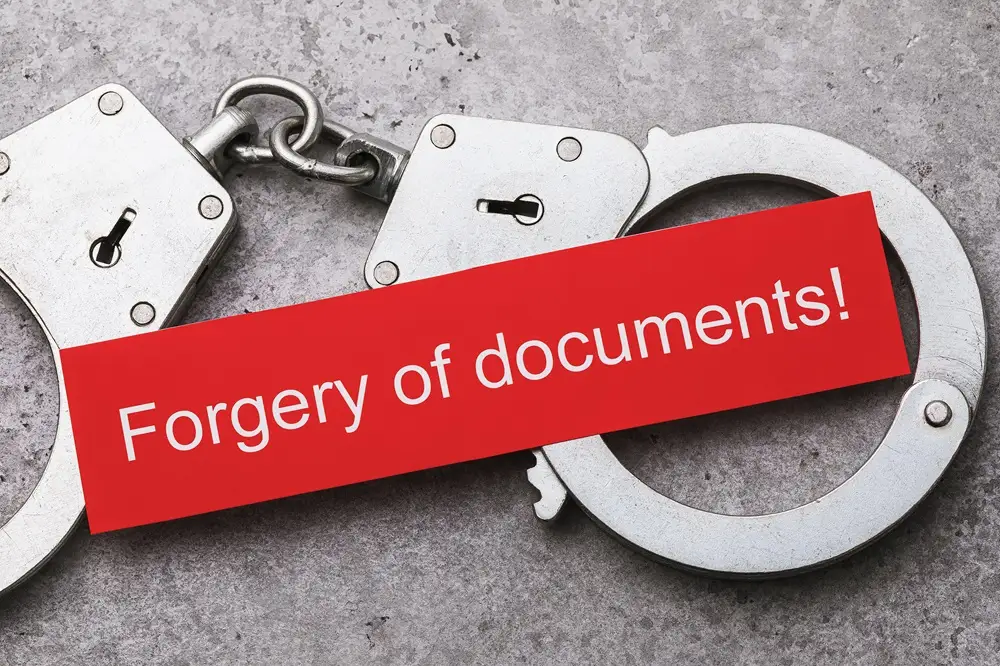What Constitutes Forgery Under Ohio Law?
Forgery, as defined in section 2913.31 of the Ohio Revised Code (ORC), encompasses the fraudulent alteration, creation, or possession of a piece of writing with the intent to defraud or injure another party.
Forgery can involve a wide range of documents, including:
Checks
Creating a fake check, altering the amount on a real check, or signing someone else’s name without their permission.
Credit cards
Manufacturing a counterfeit credit card, altering the information on a real credit card, or using someone else’s card without their knowledge.
Identification cards
Creating a fake ID, altering the information on a real ID, or using someone else’s ID to impersonate them.
Contracts
Changing the terms of a contract without the other party’s consent or creating a fake contract.
Prescriptions
Forging a doctor’s signature on a prescription pad.
This is by no means an exhaustive list — forgery accusations can apply to any document where the intent is to deceive someone for personal gain.
What Are Some Common Forgery Charges in Dayton, OH?

The following are a few examples of the various types of forgery charges individuals may face in Ohio:
Signature Forgery
Falsifying someone else’s signature on a document without their consent.
Document Forgery
Creating or altering documents, such as contracts, wills, or financial records, with fraudulent intent.
Check Forgery
Falsifying signatures or altering checks with the intent to deceive financial institutions or individuals.
Identity Theft
Using another person’s identity or personal information to forge documents or obtain financial gain.
Forgery of Official Documents
Falsifying government-issued documents like driver’s licenses or birth certificates to deceive authorities or gain benefits.
Fraudulent Credit Card Use
Using forged or stolen credit cards to make unauthorized purchases.
Counterfeiting
Creating or distributing counterfeit currency, securities, or other valuable instruments.
Forgery of Art or Collectibles
Creating or altering art, antiques, or collectibles with the intent to deceive buyers or collectors.
Each of these offenses carries its own legal implications and potential penalties under Ohio law.
What Are the Potential Penalties for a Forgery Conviction in Ohio?
Combating forgery charges in Ohio demands a comprehensive understanding of the legal statutes and potential penalties involved. The following table provides an overview of the offenses listed in Ohio Revised Code § 2913.31(A) and the penalties associated with them.
| Offense | Classification | Penalties |
| Forgery under Ohio evised Code § 2913.31(A). |
|
Based on the value of property or loss to victim. |
| Less than $7,500. | Fifth-degree felony punishable by up to a year in prison and/or a fine of up to $2,500. | |
| More than $7,500 but less than $150,000. | Fourth-degree felony punishable by up to 18 months in prison and/or a fine of up to $5,000. | |
| $150,000 or more. | Third-degree felony punishable by up to three years in prison and/or a fine of up to $10,000. | |
| Forgery against an elderly person or disabled adult under Ohio Revised Code § 2913.31(A). | Based on the value of property or loss to victim. | |
| Less than $1,000. | Fifth-degree felony is punishable by up to one year in prison and/or a fine of up to $2,500. | |
| More than $1,000 but less than $7,500. | Fourth-degree felony punishable by up to 18 months in prison and/or a fine of up to $5,000. | |
| More than $7,500 but less than $37,500. | Third-degree felony punishable by up to three years in prison and/or a fine of up to $10,000. | |
| $37,500 or more. | Second-degree felony punishable by up to eight years in prison and/or a fine of up to $15,000. |
Gounaris Abboud provides legal representation for individuals facing forgery allegations in Dayton.
















